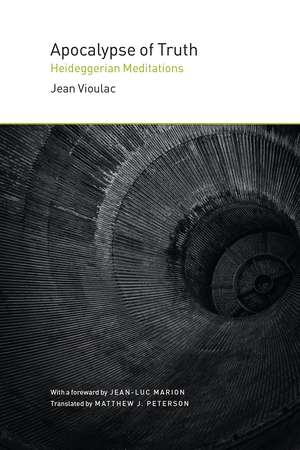Apocalypse of Truth: Heideggerian Meditations
Autor Jean Vioulac Traducere de Matthew J. Peterson Cuvânt înainte de Jean-Luc Marionen Limba Engleză Hardback – 3 mai 2021
In his first book to be translated into English, Vioulac radicalizes Heidegger’s understanding of truth as disclosure through the notion of truth as apocalypse. This “apocalypse of truth” works as an unveiling that reveals both the finitude and mystery of truth, allowing a full confrontation with truth-as-absence. Engaging with Heidegger, Marx, and St. Paul, as well as contemporary figures including Giorgio Agamben, Alain Badiou, and Slavoj Žižek, Vioulac’s book presents a subtle, masterful exposition of his analysis before culminating in a powerful vision of “the abyss of the deity.” Here, Vioulac articulates a portrait of Christianity as a religion of mourning, waiting for a god who has already passed by, a form of ever-present eschatology whose end has always already taken place. With a preface by Jean-Luc Marion, Apocalypse of Truth presents a major contemporary French thinker to English-speaking audiences for the first time.
Preț: 292.99 lei
Nou
Puncte Express: 439
Preț estimativ în valută:
56.07€ • 57.92$ • 46.67£
56.07€ • 57.92$ • 46.67£
Carte disponibilă
Livrare economică 04-18 martie
Livrare express 15-21 februarie pentru 33.96 lei
Preluare comenzi: 021 569.72.76
Specificații
ISBN-13: 9780226766737
ISBN-10: 022676673X
Pagini: 208
Dimensiuni: 152 x 229 x 23 mm
Greutate: 0.43 kg
Ediția:First Edition
Editura: University of Chicago Press
Colecția University of Chicago Press
ISBN-10: 022676673X
Pagini: 208
Dimensiuni: 152 x 229 x 23 mm
Greutate: 0.43 kg
Ediția:First Edition
Editura: University of Chicago Press
Colecția University of Chicago Press
Notă biografică
Jean Vioulac is a French philosopher who has taught at the Université Paris-Sorbonne (Paris IV) and currently teaches at a high school outside Paris. In 2016 he received the Grand prix de philosophie from the Académie Française. Matthew J. Peterson is a doctoral candidate in the philosophy of religions at the University of Chicago Divinity School.
Cuprins
Preface
Translator’s Note
Chapter 1. Clarifications
Chapter 2. From the Equal to the Same
Chapter 3. Truth and Its Destiny
Chapter 4. Apocalypse and Truth
Chapter 5. On the Edge of the Abyss
Chapter 6. Abyss of the Deity
Epilogue
Notes
List of Primary Sources
Index
Jean-Luc Marion
Translator’s Note
Matthew J. Peterson
Chapter 1. Clarifications
§1. Clairvoyance, Evidence, Lucidity
§2. Sufficiency and Faultiness
§3. History and Determination: Destiny
§4. Language and Community
§2. Sufficiency and Faultiness
§3. History and Determination: Destiny
§4. Language and Community
Chapter 2. From the Equal to the Same
§5. Machination
§6. Cyberspace
§7. Equalization
§8. Equalization and Appropriation
§6. Cyberspace
§7. Equalization
§8. Equalization and Appropriation
Chapter 3. Truth and Its Destiny
§9. Ontology and Truth
§10. Abyss and Mystery
§11. Origin and Beginning
§12. Decay of Truth
§13. Safeguard of Truth
§14. Teleology and Eschatology
§10. Abyss and Mystery
§11. Origin and Beginning
§12. Decay of Truth
§13. Safeguard of Truth
§14. Teleology and Eschatology
Chapter 4. Apocalypse and Truth
§15. The Concept of Apocalypse
§16. Pauline Thought of the Apocalypse
§17. The Apocalyptic Regrounding of Truth
§16. Pauline Thought of the Apocalypse
§17. The Apocalyptic Regrounding of Truth
Chapter 5. On the Edge of the Abyss
§18. Apocalypse of the West
§19. Poetics of Truth
§19. Poetics of Truth
Chapter 6. Abyss of the Deity
§20. The Name of the Prophet
§21. The Death of God
§22. Friedrich Hölderlin
§23. The Last God
§21. The Death of God
§22. Friedrich Hölderlin
§23. The Last God
“Only a god can still save us”
Meister Eckhart
The Adieu
Meister Eckhart
The Adieu
Epilogue
Notes
List of Primary Sources
Index
Recenzii
“In this magisterial study, Vioulac proposes a radical reversal of thought, employing Biblical inspiration and philosophical rigor. Apocalypse of Truth dares to tap into a counter-archive that reaches deeper and further back than Heidegger’s rethinking of truth as unconcealment, reviving the long-ignored idea of apocalypticism. What results is not only a stunning rereading of St. Paul, Meister Eckhart, Hölderlin, Hegel, and others, but also a subtle loosening of the mythological grip that Western ontology has too long imposed on its subjects. A tour de force in its own right, Vioulac’s book builds on the recent breakthroughs in phenomenological and post-phenomenological thought, bringing a fresh realignment with Christianity and the 'incarnation of truth' it invites us to wager anew."
“In and through a learned, historically far-reaching, and textually rigorous meditation on Heidegger’s diagnosis of our modern nihilism, Vioulac turns to the apocalyptic revelation of Saint Paul for truth that would undermine modernity’s subjection of all beings to the logic of production and management by means of rational calculation and technological power. In sharp contrast to such machination, wherein humans become—like everything else—interchangeable, Vioulac advances a thinking of the frailty and vulnerability of finite, embodied, and mortal existence, and of the love and mourning essential to such existence. Thanks to an admirably graceful and faithful translation by Matthew J. Peterson, English readers will encounter a challenging and original thinker who sheds light on the disasters of our capitalistic and technological age.”
"Including a foreword by Jean-Luc Marion, this book introduces French philosopher Jean Vioulac to an English-speaking audience. In six chapters, each with multiple sections, Vioulac takes readers through an analysis of Heidegger’s understanding of the disclosure of truth only to challenge that disclosure with the concepts of apocalypse, absence, and abyss. The climax of the book is the fourth chapter, in which Vioulac’s challenges reveal a productive encounter between Heideggerian thought and Christianity, with the latter characterized as a task of mourning an end already past. Along the way, Vioulac engages with Marx, Nietzsche, Meister Eckhart, and Hölderlin among others to provide a rich reading of Heideggerian epochal Being and the metaphysical destiny of the West."
